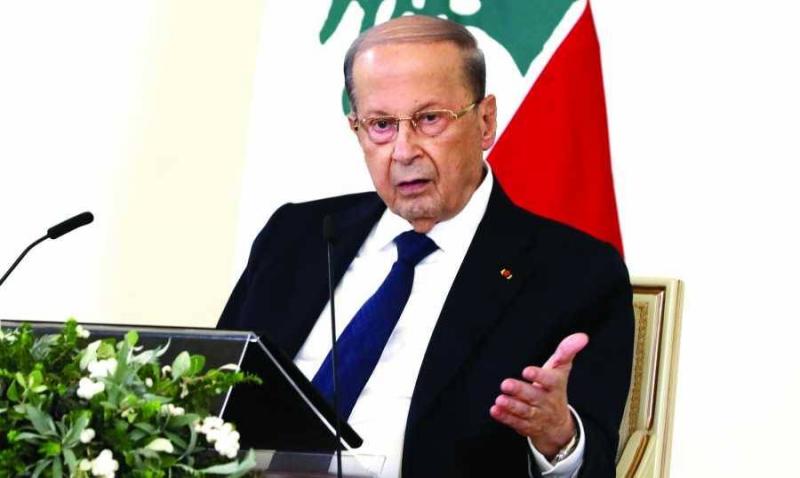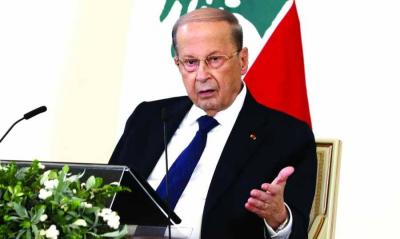Consultations to name a prime minister tasked with forming the last government of the current presidency will take place this Thursday. The date has been delayed by a month and two days since Prime Minister Najib Mikati's government effectively became resigned. Despite divisions among blocs regarding the candidate, the last-minute postponement is not something the President is considering this time. The binding parliamentary consultations remain uncertain, at least for now. They suffer from a lack of prior agreement on a prime minister designate, more than from a shortage of competing candidates. Although caretaker Prime Minister Najib Mikati still has the best chance, getting to Thursday's date is fraught with doubts. Potential candidates are mentioned day after day, but none seems to gain backing, as if the goal is merely to pressure Mikati into making concessions in the anticipated formation process. All parties act as if the main battle is over the prime minister designate, not the government he will form.
President Michel Aoun attributed the delay in setting a date for the binding consultations to the correctness of his instincts: “The delay in the blocs reaching an agreement on the prime minister designate raises concerns about what may arise from the binding consultations. I intentionally postponed the date until the idea of consensus on a prime minister designate matures, as the challenge lies in the next step: forming the government, not naming the prime minister designate. The delay has not exceeded a few weeks, although there is no constitutional deadline obliging the president to call for it. I was waiting for the old and new parliamentary blocs to crystallize their options. Some intentions became apparent when blocs acted as if naming a prime minister designate would lead to seizing all power and ruling the country through him. I waited for some time until voices emerged claiming that the president is delaying the consultations because he does not want a new government. Now, there is a call in two days. Let them come and attend.”
He adds, “No one has a declared candidate, and everyone talks about specifications and conditions they ask from a prime minister designate who does not yet exist. In contrast, names emerge daily without their owners stating whether they are actually candidates for the premiership or whether they want the designation. Thus, we revolve around names rather than around a single name. Some of the discussed profiles have respectable and appreciated backgrounds and may be needed. We need a prime minister who can accompany the upcoming months that do not only concern the presidential elections, as the government is not responsible for conducting them, but rather the Parliament holds the authority to elect the president. We want a prime minister with experience and expertise in dealing with the economic and financial issues we are struggling with.”
What does he expect from the binding parliamentary consultations on Thursday? The president states, “They will definitely take place and yield results, which is issuing a presidential statement for the designation, and I will respect the will of the deputies. I fear we may face two possibilities. The first, positive one—which I prefer—is for there to be a consensus around a prime minister designate with a decent number of votes to help him form the government. I worry we may find ourselves on the opposite side, which is the negative result that leads to naming a prime minister designate either with weak votes or lacking the necessary legitimacy or support from his community. In such a case, the task of forming the government becomes difficult since appointing him as a weak prime minister designate emerged from a parliamentary division around him. My responsibility as president is to conduct the binding parliamentary consultations and announce the designation. Later, the task of the prime minister designate begins with the parliamentary blocs, to reach a consensus with them on the specifications for the new government. The more divided they are around him, the more his problems multiply. My actual role in the stages of formation comes later because the president finally signs the decrees. The seal is with him.”
As for what kind of government he wants in the future, his stance is far from Mikati's perspective. Aoun supports “a political government for the upcoming phase, especially if it will face challenges and difficulties. It is no longer acceptable for parties to name political ministers, while we appoint technocrats. It should either be entirely technocrats—not like the current government where some ministers are questionable—or a political government. The power of the government lies in its balance. When a political government is balanced, what prevents it from being a national unity government?”
Aoun raises several questions regarding why parties link their disagreements over the designation and their haste to anticipate a vacancy in the presidency: “I do not know why they talk more about the continuation of a caretaker government than about a new government, as if they want that one instead of this one? They come to me and ask if there will be presidential elections at the end of the term. They came to me before, months ahead of the general parliamentary elections and kept coming right up to the last week before they were held, asking if they would take place. I responded positively, and the elections of May 15 occurred. Now I assure you that the presidential elections will occur on time. There will be no constitutional vacuum. There will be a president to succeed me within the constitutional timeframe, and I estimate his election will take place between August 31 and October 21, on the tenth day before the end of my term. If you will, it will be a president of the last quarter of an hour. My certainty is based on the fact that I do not bet, but I build my position on the constitution, which is my book. That is what Parliament also needs to do.”
The president comments on a requirement that falls between two others: “Between forming the government and electing the next president, there is a requirement that does not wait for either of them, whether the first is delayed or the second is obstructed, which is the judiciary that continues to work when the others take a break. Nevertheless, I still do not understand the reason for the judiciary's avoidance of a battle that is at the heart of its mission, which is to prosecute the governor of the Central Bank. I do not find any reason yet for its hesitation in prosecuting him. There are many accusations against Riad Salameh, either embezzlement or financial crimes or forgery, and he is being pursued from Switzerland first, before France, Britain, Belgium, Germany, and Luxembourg joined. Yet they protect him. In such a matter, I, as president of the republic, am not a judge or a neutral party; I am an original team against those who are the guardians of the crime committed against the Lebanese state and the Lebanese people.”
He adds, “We are on the verge of completing the forensic audit. On June 27, the main team tasked with the forensic audit will arrive to join the current team in Beirut that has begun reviewing Central Bank documents and files. I will conclude the forensic investigation before the end of my term, and it will only be announced from the Baabda Palace.”
He elaborates: “My duties include proposing the forensic audit and insisting on it, and it has now been underway since the Cabinet approved it on March 26, 2020, for a period of two years, two months, and 25 days to date. Only the forensic audit reveals the perpetrators, partners, and beneficiaries. I never said that Riad Salameh is solely responsible. He has partners. However, he takes it upon himself to defend, conceal, and protect them. The forensic audit will finally expose them. The forensic audit will not be announced except from Baabda Palace, and I prefer a political government to be the best place for him to defend himself. The man is involved and implicated.”
When he mentions unnamed partners, the president implies that he knows them one by one. He recalls an iftar he held at the presidential palace on July 14, 2019. At that Ramadan iftar, everyone—“religious leaders, former presidents, ministers, deputies, senior officials, businessmen, and media figures”—listened to his speech warning of collapse. What I said is that the fight against corruption will not stop regardless of the pressures; it is the cornerstone of the reform process. Once I finished, they all applauded, without exception. No one objected or made a remark. At that moment, I said off-script: ‘Since we are all in agreement, the process has become easier.’ Of course, I was in one valley, and they were in another.”
As for how he views the remaining time of his term, less than five months, amidst various challenges targeting him? He succinctly says, “I am not weak. I have never been weak at any point in my life or positions. In recent months, I am certainly not weak, but I am disgusted.”




